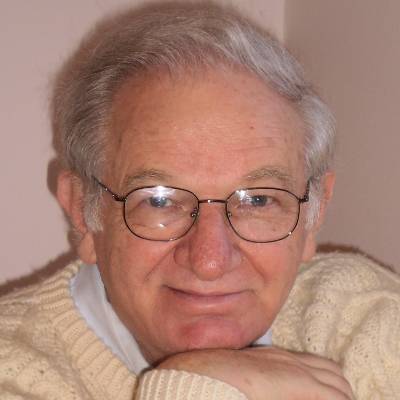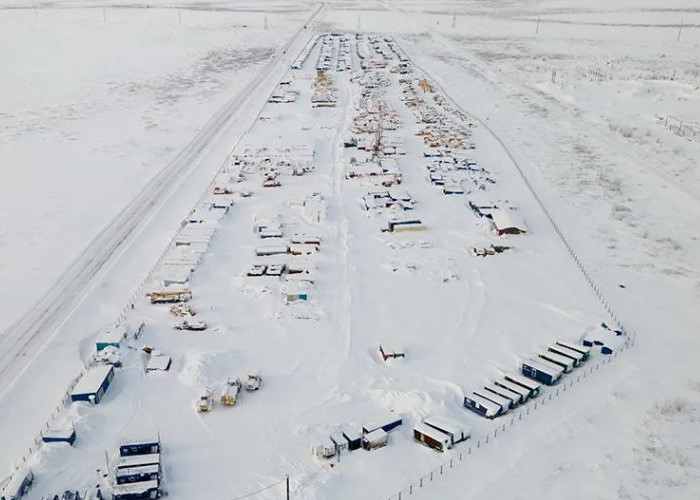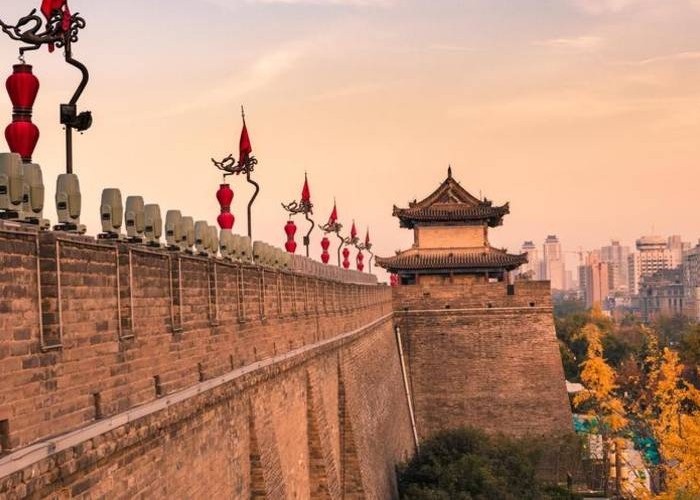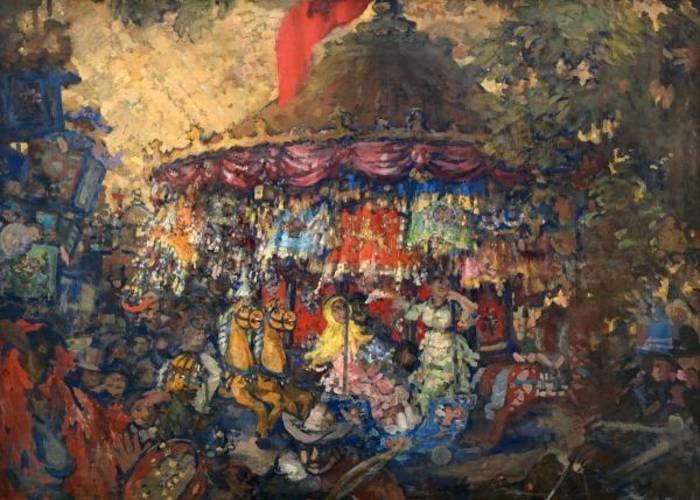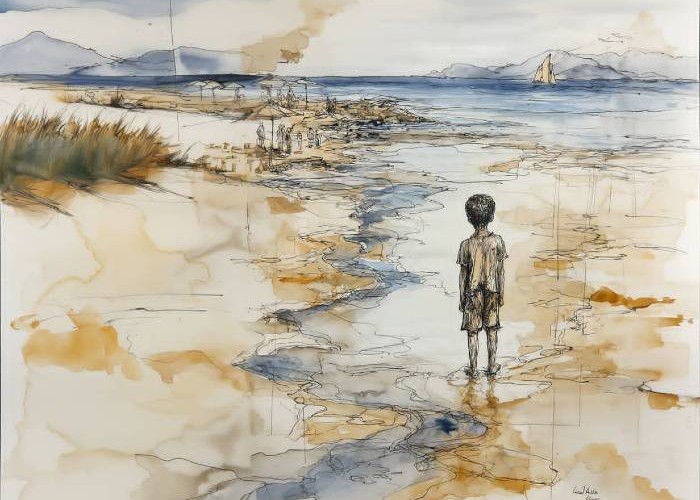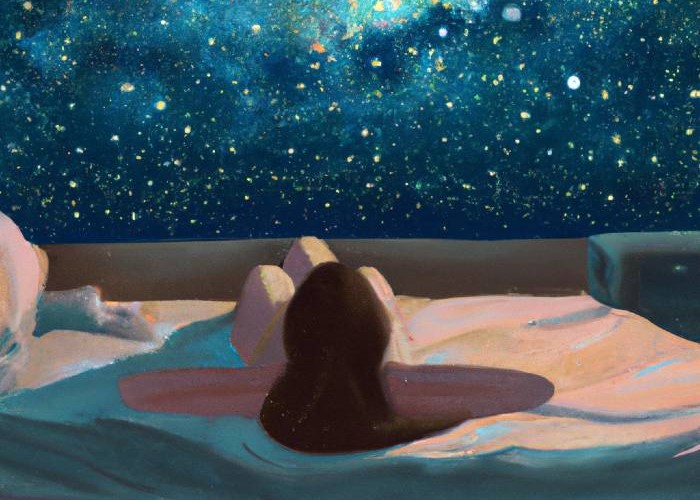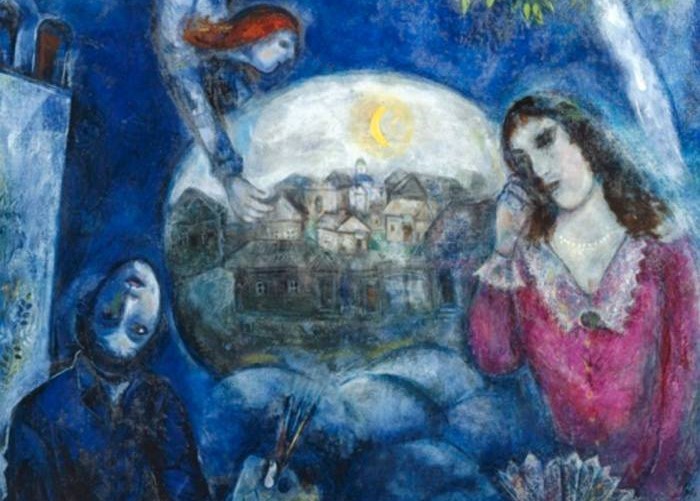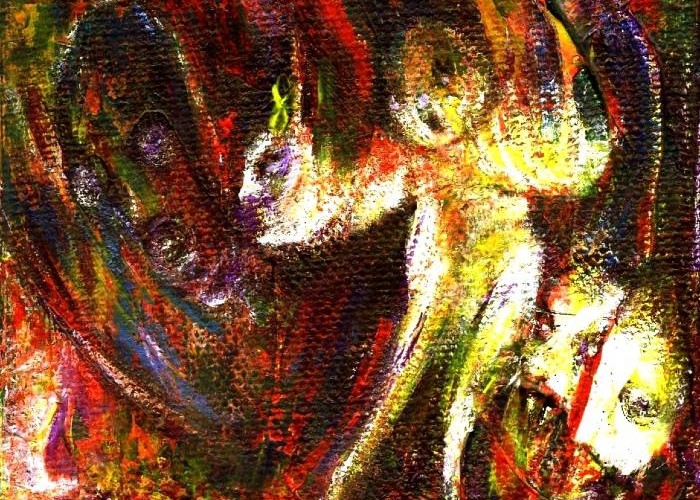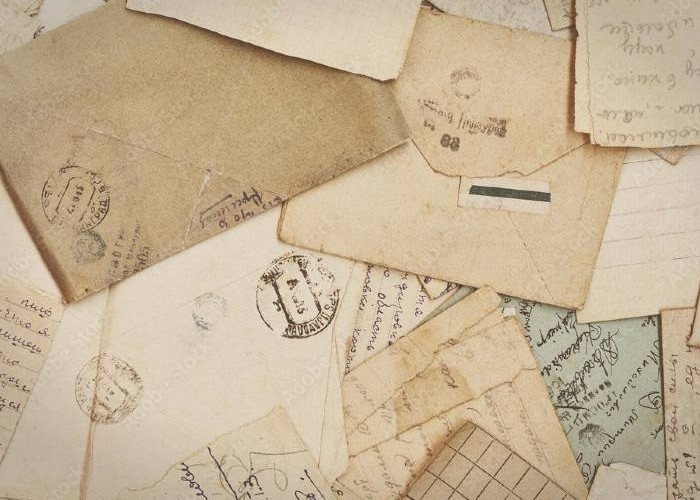May 17, 1979. Los Angeles
Hello Boris!
So, you are already in Rome; my congrats on that. You know, I hardly wrote to you all this time because I did not want to influence your decision to emigrate. Now that you are on this side of the Soviet border, it is possible to communicate with you and to be understood the right way. I am sending you some money; I remember how much I wanted, once I got to Italy, to go everywhere and see everything, and how discouraging it was that our pockets were empty. Of course, what I am posting is not enough to get a glimpse of the entire country, but I hope this sum will help you. I know how inquisitive you are. And Italy is beautiful indeed…
What can I say? You are going through a tough time right now. I still remember it. Today, at least you know from the letters of thousands who have already moved across the ocean, how Soviet Jewish immigrants are received, but we, the first ones, in the early seventies, migrated almost blindly, at random, as if jumping into an opening with water, knowing neither its depth, nor width, nor the temperature of the water. We placed our hope in our muscles, our ability, if not to swim at a minimum, to stay afloat. The previous life was cut short, and a new one was about to begin, of which we had the broadest idea, a little clearer – but not much – than that of the other world. Different illumination was expected (no dark corners, as there is plenty of fringe lighting), a complete absence of pain, and a smooth, general fluidity of movement was assumed… In our purses, side pockets, or even just in some skirt crinkle of the brain, like a magic pill to aid relaxation, we clutched the few bits of information that should help us endure and decompress our breath. Often, it was the phone numbers of a few acquaintances who had landed on the other side and were waving a handkerchief over their heads— “Here, I’m alive, it is no big deal, jump, and you’ll also survive.”
We got to Rome, as you did, with a stop in Vienna, but we did not get there by train through the border station of Chop, but by plane from Moscow. When we arrived at Vienna airport, giant porters appeared from somewhere, quiet, in white overalls, fished our suitcases off the conveyor belt, and helped to carry them out. After the hustle and bustle and pre-flight confusion at Sheremetyevo, the cleanliness and shine of the plastic floor at Vienna airport were, of course, all from a futuristic film about a space station. How we found ourselves on the movie set is another question, for which there was no immediate answer.
The porters lifted our suitcases, and I felt a twinge of unease inside me. It was an instinct, a familiar shudder in my past life when a stranger touched your luggage. How many times at the movies had the entire hall swooned when, on the screen, the hero of a foreign movie left his valise at someone’s door to go downstairs, to talk to the concierge? “Now someone is going to snatch it,” flashed in our minds. But the hero, having talked enough at ease, came back, not worried, picked up his bag, and went on to his movie business. That was a man from another world—from the anti-world. And now I, Ilya, was in it, in this anti-world, where no one puts his suitcase between his feet, stopping in front of a shop window…
You are already in Lido di Ostia, on the Roman outskirts, Boris, and that is great. I remember well the time when we stayed there while being processed for entry visas to America. It was an unexpected hiccup in our run. A time to stop, a time to take a breath, a time to look back and look ahead, into the unknown. A time full of unusual worries and a time carefree. Just wait, learn the language, and sightsee Italy. It comes to mind now, that time, like the title of an American movie with Gregory Peck and Audrey Hepburn — Roman Holiday. A vacation not earned yet, but as if given in advance. Fate had extended it for a taste test. It felt as if the smiling peasant women in colorful headscarves at our markets in Odessa were holding out, at the tip of their knives, pieces of fragrant butter wrapped in corn leaves. If this is the sample, one thought, how incredibly delicious the rest of it should be.
This natural extrapolation of what is coming occurs to anyone who has left their country, foretelling their new life.
But the vacation was over. The first—the hardest—stage of emigration has arrived, and you must be prepared for it, though I realize it is impossible.
That knife, whose coldness I felt in my heart on my first night on American soil, had long since been forgotten. Soon, I found a job at an air-cooler design firm. After a while, so did Lina, in the quality-control department of a small company producing electronic contactors. Whether it was our survival instinct that kicked in or, for some other reason, at first, the past life faded into oblivion.
Only dreams remain. According to one of them, which was often repeated during the first years of my life in America, I am again in Odessa. I walk the streets and see my friends and acquaintances, but it is time to leave. I hurry to the station. Here I am at the customs officer’s booth. I hold out my passport and notice there is no exit visa. A young border guard with high cheekbones, quite a boy (they seem to hire the youngest since it is difficult to bribe them), looks at me and says, “Step aside, citizen.” I rummage in my pockets, turn them inside out, and rip through the bag. But – there is no pinkish piece of paper – an exit visa with which I left the country. What will happen now? Fear grips me. The situation is not resolved. The border guard, his cheekbones twitching, looks at me. On the edge of despair, I wake up in a cold sweat.
Later, I found out that such a dream not only visited me but also many of those who left Russia. Both those who did so after the revolution during the Civil War and those who were moved by the Germans during World War Two. What is the power of this country that both beckons and frightens to death?
This is all the more amazing when you consider that we didn’t have our own Moses. We had to decide for ourselves. However, the decision was not so difficult. For the first time in decades, there was an opportunity to jump out of the cage in which you had managed to come to this world. Such an opportunity Russian people could not help but envy.
Besides, unlike them, we, fleeing from the land of the red pharaohs, did not have that attachment to overcome. We didn’t, because from the time we were young, we were reminded at every turn: you are not our kin. And not even a distant cousin… You are not ours in any way. Even Comrade Stalin, although he is also of non-Russian nationality, is a Georgian, and he is part of our indigenous population. We also have other ethnicities– Uzbeks, Turkmens, and even Tatars. But they are ours. And you, Jew, are not ours. Because you are not a human being, but a weed, a tumbleweed.
Is it any wonder that after leaving the country where I was born and grew up, I discovered an incomprehensible psychological phenomenon – the inability to pronounce three words: “Russia is my Motherland”? That is, it turned out that the mere fact of being born and growing up in a country does not make it your “motherland”. This is especially true of Russian culture, whose patriotic rhetoric is centered on such expressions as “Mother Russia”. For us Jews, she was more like “Stepmother Russia,” the evil stepmother from the Cinderella fairy tale.
I am glad I departed. I had no doubts about it. The feeling that I had undergone a life-threatening operation came much later, when I fully embraced my new American life, breathing a different, fresh air. Only then did I feel the pain of separation in full measure. “Emigration is a bloody business,” agrees my local friend, a former Leningrad resident, a Ph.D. in engineering, a man devoid of any sentimentality or other unproductive emotions. He does not explain what he means, but I understand. Whether they have cut you off from your homeland, whether you have swung a knife in despair over your sinful body, and your soul crushed by hopelessness, life is in no hurry to close the incision. At first, the instinct of self-preservation works like the strongest anesthetic. You do not feel pain. The anesthesia passes slowly. Pain pierces you later when you have already half-aligned with the unfamiliar country. You feel the first incision of the epidermis all over again, the scalpel tearing the nerve cells. The blood oozes out. Fountains of capillary blood spurt out.
…Of course, time, that skilled physician, heals your wounds. However, what is cut off cannot be repaired. Just as a jogger who has been hit by a car and lost his leg cannot reconcile himself to the fact that he can never again hear the crunch of the cinder track beneath him, the feeling of irrevocable loss does not leave you… Those crowds of people running through Rome with their knapsacks and their crying children, having made it to America, would not perish here. The vast majority will make a go of it. Some will even make a good life for themselves. I am an ordinary engineer, with no supernatural talents, but once a year, on vacation, I can afford to go to the same Italy as a tourist, so that this time, I can look at the local beauties again, without counting the coins.
But this is another life. And this is another person writing to you. The hardest thing is that the sense of the continuity of being is lost. The life of an ordinary person, unencumbered by a self-assigned mission, is imagined as a story. There is the setting of childhood and adolescence, the point of emotional reference for your lifelong journey. Remembering the past makes you realize you are growing up. When the homeland has disappeared into the fog behind the last turn of the train, everything else loses its tangible reality. Something must bring you back to the bygone days to remind you that you move in time, that you live. Meeting a friend from a former time… Encountering a girl whom you once ogled from afar, but now, look how she has grown, you do not recognize her… Here is a corner of a familiar building, quite different now, but something brings your memory of it to life.
I came to Baltimore last summer on a business trip and met up with an old friend from Odessa. We walked down a quiet street. A neat little house with a green-painted wooden fence enclosing a flower garden. A wicket… We were walking, talking about a new oil pump, which my friend had invented and applied for a patent, and he stopped, looked at the gate, and said, lowering his voice, though we were alone in the street:
“Look, it is essentially the same thing. A wicket! But what a difference!”
And he knows I will understand what he means. Nostalgia has nothing to do with the authorities of your homeland. There has never been more despicable than the Soviet ones. Your longing is not about the country but about the bygone years. That is right, you lose them, no matter where you live. And not that you are abroad, but that it is forever. Oh, that is a tremendous difference! If you know you can go back to where you grew up, then you are on vacation or, rather, on a business trip…
I will never forget the face of Lina’s mother on the day of our departure. She cradled Sasha, her grandson, who had spent the last two nights of our packing at her house. Having adored him to death, she clung to her grandson and could tear him from her breast through sheer force when it was time to say farewell. Her face was strained in bewilderment, confused, expressing nothing but disbelief. She could not bring herself to part with her daughter and her grandson. I understood later, in America, why. She could neither understand nor accept that it was forever, that she was seeing them for the last time. No matter how complex and omnipotent the human brain is, there are things it can never comprehend. It is impossible to say farewell to the living as if to the dead. If loved ones are alive, it is natural to believe that they will see each other again…
Some immigrants here, pining for their loved ones back in their homeland, produced a way to see them, bypassing the bloody Soviet cordon, barred forever for us. They bought vouchers for a steamboat cruise around Europe, calling at Mediterranean and Black Sea ports, including Odesa.
Everything was going well in Naples, on the island of Santorini, and in Istanbul. Together with other tourists, our immigrants also went ashore but gazed at the local sights with an absent look. They waited for Odessa…
When the steamer entered the Odessa harbor, an enormous crowd of people had already congregated on the pier. Not only Odessans but relatives and friends from other Soviet cities had gathered there for the occasion. They lowered the gangway, and before the boarding gates were opened, the captain announced over the ship’s radio that he had just received instructions from the authorities that everybody could go ashore, except for those whose passports showed they had been born in the USSR. All hell broke loose there! Months on end of hopes… Mountains of gifts, for which they spent a lot of hard-earned money… But the main thing was that here, their faces white with excitement, they, their beloved ones, stood on the shore, waiting for their loved ones. They stare at the decks, hoping to recognize those for whom they have longed.
Then the female Greek tourists, realizing what was going on, went on strike, stating that they would not go ashore in protest, and sat across the gangway. The Italian and American women followed.
The captain was furious. When they rushed to him with anger, he said he had never seen a greater abomination in his life, but that he could not guarantee the safety of those passengers who disobeyed the authorities and went ashore. What was there to do? The only thing to do was to once again curse the country in which they had the misfortune of being born. But every cloud has a silver lining. After this episode, nostalgia vanished as if by magic in many people.
It is interesting that here in America, not among the people born here (they see nothing wrong with nostalgia, sometimes even ask if we suffer from it), but in our ех-Soviet émigré community, it is accepted that nostalgia is something to be ashamed of. Some time ago, I brought my poems to the editor of our émigré newspaper. She read, and her head in its short haircut shook. “What is it with you, young man? You seem to suffer from nostalgia!” As if she caught me doing something shameful, like masturbation… Or she is right, and nostalgia is a soul twin of it…
And the fact is that it is such a natural human feeling—to be afraid of estrangement from the past. Not by chance, since the times of Homer, expulsion from one’s country was considered the second heaviest punishment after the death penalty. I work, I raise my son, I sleep, I eat in wonderful restaurants, and I travel around the country. But sometimes pinch me to make me believe I am alive. America is a beautiful country with affable people. Yet this is not my country. The language is not mine. And the culture is not mine, although I go to theaters as often as I can and read the best American novels in the original. This is a different world, although not ideal, but immeasurably better than the one where I grew up and lived. Cleaner, more conscientious, and fairer. But this is a different world. I do not know how to convince you of this; you need to feel it yourself, but I realized you can feel happy only where you grew up, even if it is such an awkward country like Russia, capable of the rise of spirituality of the highest caliber and the most unbridled vileness.
Why else, tell me please, do I wake up some mornings feeling not myself? It is time to get up, and here, as a thief who has spent the whole night fiddling with the door lock, which succumbed to him only in the morning, in despair and anger at his ineptitude as an inexperienced burglar, comes down on me that glimmering, blue-tinged, winter dawn outside the windows in laurel patterns of marshal’s epaulets. It is an eternal California summer, and here I hear boots crunching in the freshly fallen snow. Breathing heavily from racing in the cold, my neighbor from Odessa, the stoker at the city hospital on Marazlievskaya Street, comes back from his night shift. I am lying there, waiting for him to stop at the door, and before he enters, to scrape the snow from his felt boots against the bracket attached to the threshold, to cough once or twice, and to click the key in the hole.
Then I know it is time to get up. I wake up, my feet touching the synthetic carpet that covers the floor of our bedroom from wall to wall, instead of the cooled-down slippers of my Moscow life. It is warm outside, and the sun is shining. I roll my car out of the garage, and, for some reason, I have a lump in my throat and a pounding in my chest. It is not a big deal, of course, it passes, and I overcome it by midday. But tomorrow is another morning. And then another… Why is that? Tell me, please. Do I not live two hundred times better by any measure?
Strange, strange, is the way of man… Do you know what the most terrible test here is for many, many people, although they will never admit it? And here is one: deciding what to do with your life. There was no such problem back in the Soviet Union. Living to survive was the goal itself. To overcome everything that threatened, it filled one’s ordinary life with meaning. Forget about the negligible number of those who had ambitions. Career, fame… Ordinary people did not think about that.
I have a distant relative in New York, in Brighton Beach; she lives not alone but with her aged husband. She lives well; she needs nothing. She has a pension, and her illnesses do not bother her too much so far, although they would be a salvation for her from other kinds of torments. During my recent business trip, I dropped by her place. “How are you, Irina Mikhailovna?” I ask. “I’m okay, dear Ilya. The only thing is that it is boring. You know, so boring! If only the war started somewhere, or something…” “Have mercy, Irina Mikhailovna,” I say, “there are over thirty wars in the world now. Don’t you watch the news on your TV?” “No, no,” she says, “it is somewhere out there, in faraway places.” “Do you want it to be here?” “No, why? Not here, please. America is a good country. But if it were somewhere close…” “Why?” “It’s interesting…”.
You say she is a strange old lady. Maybe… But is she to blame for such a strange desire? Here you will wonder a hundred and fifty times what you live for. Those who have children deceive themselves by telling themselves they live for their children. This self-deception can last, however, no longer than the now-American offspring of yours turns eighteen, and, having received a high-school diploma, he drives off in a car to a college somewhere in Kentucky, waving goodbye with a baseball cap. He will come back at Christmas or Thanksgiving when colleges are closed, and most often will send you text messages asking for money.
Many understand that a family, that solid watermelon, first cracks along the language line, that, with English, came to their children also a different, non-Russian way of exhaling, as well as thinking. My friend, an intellectual, in despair at the fact that his daughter shied away from her native language, went to extremes.
“It cost me blood and gray hair,” he says. “I paid her ten dollars a day to rewrite Pushkin’s Eugene Onegin. It was my book. I had a point. That is how she memorized Russian. She speaks, but she writes terribly. Yesterday I received a postcard from Michigan, where she attends a university, “U minya budit ekhzamin.” [misspelled “I have an exam coming”] You know—”ekh! zamin…”
With all this, my friend, I know it is hard for you to understand now, but there will be many upheavals for all of you, not so much external, but coming from the inside… However, I will talk only about the people in my circle. After all, most of us were idealists. Here the years have passed, and, my God, how we live our lives! Where has our idealism gone? Every time I ask myself, did we come here just to eat the best pastries, buy houses, and have “fun,” as much fun as possible? In Russia, we called it philistinism. But here, in the States? You should have seen the faces of our people here, in the States, the faces of cultured people. They learned to smile from the locals, but there is boredom and emptiness in their eyes. Here, it turns out that the genuine test of a person is the test of affluence. Who will pass it? Unique people, loners, and obsessives, whom our immigrants call crazy behind their backs. But it is a shame. Some talented people and people otherwise extraordinary are among them. There, in Russia, they could not show what they were capable of because they were Jews, and they were not Communist Party members. And here, there is no one to push them around. The flounder pulled to the sea surface is torn from the inside by pressure. So, there are a vast number of dead-eyed flounders floating, belly-up, here…
For a long time now, with two regular American salaries, Lina and I have forgotten about our former poverty. We have a house, true, without a pool, but it is spacious, two stories high. Two cars, one new and one in decent condition. We go on vacation every summer, now to Hawaii, now to Mexico, now to Canada. We have also been to Europe: we have seen London, Paris, Munich, and Amsterdam. Not a trace of the miserable life in Moscow remained. But I am surprised to notice that I regret that I am no longer in need. There was something irreplaceable about the time when we lived with a constant lack of money. Our poverty kept us from pondering, prompting us to act. And we were closer to each other more, needed each other more… What good would it do to count every penny left before the paycheck? But there was also some pride in my family. They say it is hard, but it is okay; we manage. We are pulling it together.
Back then, Lina tried especially hard. When there was a week left before her paycheck and the only money left was for the subway, Lina, picking her pockets for change, bought frozen cod, thawed it, put it on a baking tray, poured mayonnaise on it, and baked it in the oven. It was delicious and cheap. Lina found satisfaction in these worries. Grumbling about her poverty, she was still proud of herself. And I was proud of her, of her housekeeping. Here, in America, we have enough to eat, and Lina’s household skills are of no use. Although she would not admit it — how could it be so? Poverty was eating us up! It was also the reason we had left the country, let us face it! — She also misses the gambling and excitement of the soul that was brought by the hard life in Russia. No matter what you say, in surviving, the family pulls together. Every day is filled with meaning. You do not have to think, as you do now in America: “What on earth do I want out of my life?”
It is a troublesome question. Not everyone can answer it. It is not by chance that Lina’s favorite story is “The Gifts of the Magi” by O’Henry. Remember? To give the girl he loves a set of tortoise combs with shining gemstones, of which she had long dreamed, the young man sold his pocket watch, and she, without knowing it, gifted him with an expensive watch chain, for which she cut off and sold her luxurious hair.
Many of us who grew up in poverty accept our lives constrained by money as a test of human relationships.
What is there to test them with now? Sufficiency soothes life. Lulls it into a state of indifference. When money is needed not just for survival, then comes the harmonica line. Quite different sounds, and strange, unfamiliar music… Money yanks at you, and it is not you who controls it, but they control you…
We do all right as far as social contacts are concerned. The nicest of our acquaintances is the former film director Sergei, a tall gray-haired man with sad eyes, who loves to drink, as many Russians do. When we get together, he tells entertaining stories from his film-bohemian past. About his cheerful spring trips from Moscow, still frosty in the February winds, to the Crimea for on-location shootings, where he enjoyed the free-spirited lifestyle of filmmaking. Telling about the past, he looks younger. The wrinkles disappear on his cheeks and around his eyes, glistening as if it were only yesterday. Without leaving his beloved film studio, he is on a set staging a scene to shoot. He shouts, squinting into the lens, to the lighting technicians to splash a little lighter from the left “wagon” on the top of the actor’s head, and to the makeup artist to powder an actress’ nose, because it glitters like on a faience doll.
Because of his practical lack of English, Sergei does not even attempt to return to his profession. To feed his family—his wife, an actress, and his young daughter — luckily, he still has the working skills of his youth. He repairs old cars in a garage whose owner is an old friend from his college days. He collaborates with other wordless workers, Mexicans, who often cannot read or write even in their own language. Sergei lives in complete detachment from his past, so vivid that the hope of extending it into the present, here on the quiet coast of the Pacific Ocean, does not even arise because of its ephemeral nature. Every day, like a trainer in the jaws of a predatory beast, he plunges himself waist-deep under the wide-open car hood, crawls up, lying his back on the low scooter board, under the limousine belly. He does not complain about his fate. Only after drinking in close company, from time to time, he says, his eyes shining, even with a certain pride:
“Well, I had twenty years of real life. Now I am a man with an amputated future.”
These words make me shudder every time. I feel sorry for this beautiful and kind man, and for myself as well, even though I had no such freewheeling life in Russia. There was only the hardship, a boring job, running around the city streets with my briefcase trying to find decent food for my family, and if I was lucky, placing my poems somewhere.
There is another married couple in our company. The wife, an actress, is smart and good-looking, but she drinks a lot and smokes cigarettes after cigarettes. She has a frozen smile on her face that makes me uncomfortable. Her voice, harsh and smoky, trembles when she speaks:
“In my theater, I was known as ‘the cemetery of unperformed roles.’ And I could play Ophelia, and Hamlet’s mother, and, with good makeup and overlays, also Polonius. That is the creative range I felt in me. But here I am…,” she says, laughing and inhaling her cigarette smoke. And she is coughing, coughing…
Her husband, nice and always smiling, rosy-cheeked, like a baby who has just returned from a walk in the cold, talks about the merry life in Moscow behind the scenes of the theater where he served as a literary manager. Oh, what wonderful backstage life that was! And they always had the dough, because it was not that hard for an intelligent, smooth-talking person to arrange an “off-the-books” concert for the actors in a sanatorium, where they were also provided with first-class food and drink.
And how easy it was to take an actress backstage after a performance, to his office, to a sofa covered with red leatherette, which he had received after the production of the play titled Princess Turandot. From his stories, you could conclude that it was such a wonderful life!
Out of shyness, I hesitate to ask the natural question, “If everything was so wonderful, why did you have to leave the country?” It is quite clear that there will be nothing of the kind here—either actresses or concerts (neither off-the-books nor “on-the-books”), no backstage office, not even backstage itself. No princess, no Turandot…
By necessity of immigrant life, the rosy-cheeked man took a sped-up course, got his license, and became a real estate agent. He made good, fast money. As was customary here, in California, he got a house with a swimming pool, two cars, and a pack of friends. It would seem, to go on living, and not worry about anything… But no, as soon as we get together, all they do is talk in the past tense, “Oh, how beautiful a life we had!” But it is not so bad now either! Besides, all is not lost yet. Yes, America is a different country, but it is not an evil one; it is more like a good one. Why not look forward? Why look back? Why sigh and moan? There is no going back, anyway!
But sometimes talking about the past overwhelms me. “Is that all?” I think. “Is my life over? It is a creepy thing when not frail old people, but people who are still full of energy, feed on memories.” I am horrified to think that, in a little while, I too will only look back, like the others in our small company. That I, too, will lose hope that, at last, I will live a full, real life. Live a new life. I reasoned to myself, just like you, I left Russia not so much because of the abominations of life there, which as a Jew I received in full measure, but because that life had become predictable until one’s very last hour. Russian life offered no chances, no hope; it was a dead sea, devoid of oxygen, in which only a microbe could survive.
But I am writing to you about all this in vain. It is impossible to understand someone else’s experience without having your own. I remember reading about a man who suffered from a headache. When he was asked what it feels like, the headache, he realized for the first time that you can understand someone else’s pain only when you suffer from it as well…
Why am I writing to you all this? Because there is no one else to tell about it. No one around me would understand it. Remember the ancient Greek legend about the barber of King Midas? Under penalty of death, he had to keep the secret that the king had donkey ears. But he could not hold it in himself. One day, he ran out into the field, dug a pit in it, and uttered the secret that had tormented him. In time, bushes grew in the place of the former pit, and when the wind rose, in the rustling of the leaves, one could hear, “As for King Midas, he has donkey ears.”
Hugs, Ilya.
——————————————————
Both versions—the Russian one and the English one—are the author’s.
